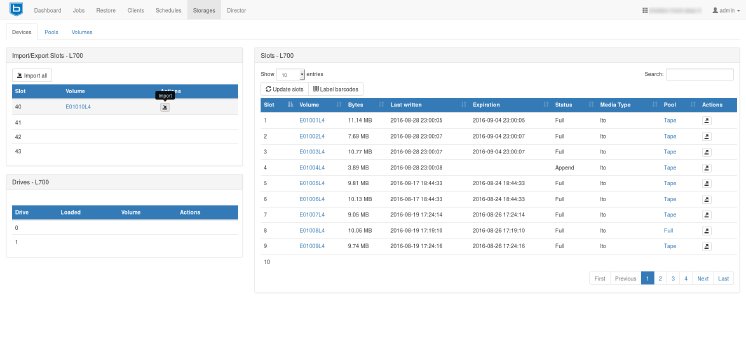The front-end is now multi-lingual: users can choose at login between English, German, French and Russian. Further translation projects have already been started by the community. The clients’ list now shows, if there are updates of the Bareos software available for each client. Also new is the handling of autochangers within the GUI: used drives and tapes are shown, tapes can be labled and im / exported.
With 16.2 the multi-tenancy implementation was completed by filling some long standing gaps in the ACL implementation. Users can now only see and restore data to the client(s), they are allowed to regarding the defined rules and roles. This development was particularly sponsored by customers from the ISP industry.
Also supported by an ISP ist the development of the “Client Initiated Connection” feature. If enabled, all connections between a backup client and the Bareos servers are initiated from the client. This way laptops can connect from different network segments in an enterprise network. Servers on premise can connect to Bareos backup servers at external sites, without the need to grant access to the internal network from outside service providers.
The new feature “Always Incremental” is interesting especially for users with big data: time- and network-capacity consuming full-backups only have to be taken once. Sub-sequent backup jobs can only transmit changed files incrementally to the backup servers forever. The new way of merging the existing incremental backups on the server, reduces the number of necessary synthetic full-backups on the server. This means an enormous reduction of needed CPU-time and storage space on the server but still with improved restore times.
The new release also comes with a new directory structure for configuration files, which is optimized for configuration provisioning and the base for the new configuration API. Using the API or the command console, for example clients can be created and the according configuration files are automatically generated by Bareos and saved to the right directory.
The new MySQL plugin offers the possibility to make hot-backups of MySQL / MariaDB databases with Bareos, as well as point-in-time recovery of databases.
Links:
- Download: download.bareos.org/bareos/release/16.2/
- Release Notes and documentation: doc.bareos.org/master/html/bareos-manual-main-reference.html
- Screenshots of the web UI: www.bareos.org/en/bareos-webui.html
- Open Source Backup Conference osbconf.org

